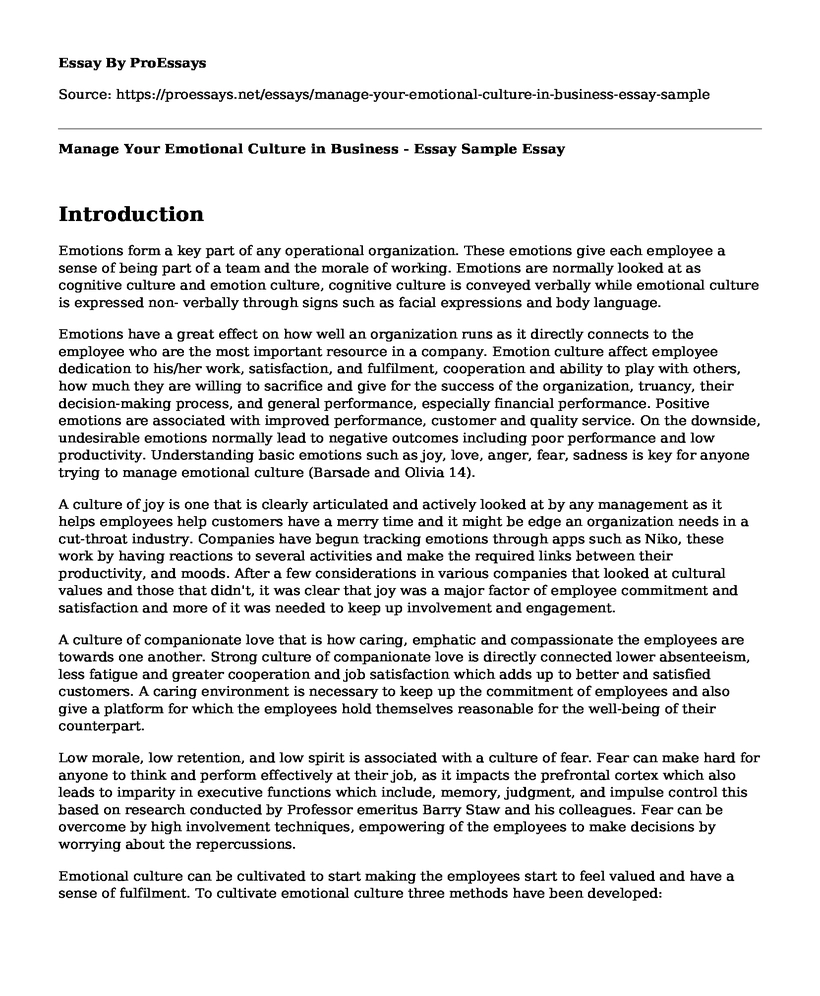Introduction
Emotions form a key part of any operational organization. These emotions give each employee a sense of being part of a team and the morale of working. Emotions are normally looked at as cognitive culture and emotion culture, cognitive culture is conveyed verbally while emotional culture is expressed non- verbally through signs such as facial expressions and body language.
Emotions have a great effect on how well an organization runs as it directly connects to the employee who are the most important resource in a company. Emotion culture affect employee dedication to his/her work, satisfaction, and fulfilment, cooperation and ability to play with others, how much they are willing to sacrifice and give for the success of the organization, truancy, their decision-making process, and general performance, especially financial performance. Positive emotions are associated with improved performance, customer and quality service. On the downside, undesirable emotions normally lead to negative outcomes including poor performance and low productivity. Understanding basic emotions such as joy, love, anger, fear, sadness is key for anyone trying to manage emotional culture (Barsade and Olivia 14).
A culture of joy is one that is clearly articulated and actively looked at by any management as it helps employees help customers have a merry time and it might be edge an organization needs in a cut-throat industry. Companies have begun tracking emotions through apps such as Niko, these work by having reactions to several activities and make the required links between their productivity, and moods. After a few considerations in various companies that looked at cultural values and those that didn't, it was clear that joy was a major factor of employee commitment and satisfaction and more of it was needed to keep up involvement and engagement.
A culture of companionate love that is how caring, emphatic and compassionate the employees are towards one another. Strong culture of companionate love is directly connected lower absenteeism, less fatigue and greater cooperation and job satisfaction which adds up to better and satisfied customers. A caring environment is necessary to keep up the commitment of employees and also give a platform for which the employees hold themselves reasonable for the well-being of their counterpart.
Low morale, low retention, and low spirit is associated with a culture of fear. Fear can make hard for anyone to think and perform effectively at their job, as it impacts the prefrontal cortex which also leads to imparity in executive functions which include, memory, judgment, and impulse control this based on research conducted by Professor emeritus Barry Staw and his colleagues. Fear can be overcome by high involvement techniques, empowering of the employees to make decisions by worrying about the repercussions.
Emotional culture can be cultivated to start making the employees start to feel valued and have a sense of fulfilment. To cultivate emotional culture three methods have been developed:
Harness What People Already Feel
Naturally, some employees have desired emotions which shows signs that you are building the right culture. Some who periodically experiences the desired emotions can be aided to sustain them with careful handling. Having programmes such as meditation and mindful apps help incorporate desired emotions.
Modeling of Emotions to Be Cultivated
This is achieved through behavioural mimicry and subsequent changes in body functions, this simply means it is easy to transmit emotions to other people.
Getting People to Fake It Till They Feel It.
Research has shown that people are likely to copy the group's norm of emotional expression. Individuals begin to demonstrate internalization of particular group traits in order to thrive.
Works Cited
Barsade, Sigal, and Olivia A. O'Neill. "Manage your emotional culture." Harvard business review 94.1 (2016): 14.
Cite this page
Manage Your Emotional Culture in Business - Essay Sample. (2022, Nov 21). Retrieved from https://proessays.net/essays/manage-your-emotional-culture-in-business-essay-sample
If you are the original author of this essay and no longer wish to have it published on the ProEssays website, please click below to request its removal:
- History of Schizophrenia Treatments: Research Paper Example
- Paper Example on Modern Psychology
- Senegal Market Research: International Business
- Paper Example on Building Trust & Strengthening Relationships: Creating an Emotional Bank Account
- Research Paper on Biological Methods Used to Treat Schizophrenia
- Keeshan Parekh's Unethical Behaviour: Trustworthiness & Disloyalty - Essay Sample
- Essay on Panic Disorder Prevalence in Primary Care: Addressing Mental Health Needs







